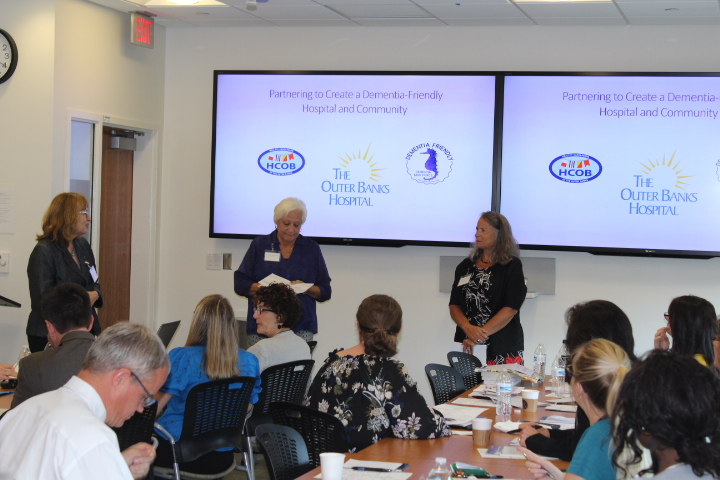
UNC’s Center for Aging and Health has received a three-year Duke Endowment grant award that will train hospital staff, clinicians and providers to recognize dementia patients, followed by coordinated community care at discharge. The Dementia-Friendly Hospital Initiative (DFHI) will be piloted at UNC Hospitals Hillsborough Campus and will advance and embed a dementia-friendly care structure, focused on the unique needs of patients. Concurrently, UNC Hospitals Hillsborough Campus has earned the first-in-state accreditation for its geriatric ED. An advisory board meeting took place on September 26, 2018.
“People with dementia don’t behave the way you’d expect in the hospital setting–it is traumatic for them and challenging for caregivers and families,” said Dr. Jan Busby-Whitehead, director of the UNC Center for Aging and Health, professor and chief of the division of geriatric medicine, and principal investigator of the DFHI project.
“We think of our hospital environment as a place that cares for everyone, but people with Alzheimer’s disease are truly challenged when put in the traditional hospital environment. We know there is an increase in morbidity and readmissions that also costs the system.”

The pilot will include the development and implementation of a training curriculum for everyone who interacts with patients and their families–from transportation to housekeeping to food service and environmental services. This includes meal preparation where color impacts eating and nonpharmacological approaches to behavior management. It will then be expanded to NC Memorial Hospital, Pardee UNC Health Care, and Wayne UNC Health Care. Busby-Whitehead says the effort will be supported by strong relationships with NC’s Area Agency on Aging and many other community care partners.
“We don’t want our approach to end when patients leave our hospitals and go back into the community,” said Busby-Whitehead. “We want to build a network that’s safe for them.”
Alzheimer’s disease, the most common form of dementia, is the sixth leading cause of death in North Carolina, affecting one in ten people over the age of 65. Caring for people with dementia is a serious burden on North Carolina’s hospitals. Over 160,000 people are believed to live with the disease in NC, and this number is expected to increase to 210,000 by 2025.

“We don’t see the patient’s care giving environment,” said Busby-Whitehead. “We’re only seeing the tip of the iceberg. We feel establishing these collaborations will be key to the continued success of this initiative.”
First Advisory Board Meeting
A kick-off advisory board meeting last month brought together community aging experts, including representatives from the Outer Banks Hospital, the first NC hospital to create a designated dementia-friendly environment.
“With 60% coming through the ED, we’re finding patients at the cross roads of care,” said Kevin Biese, MD, MAT, associate professor of emergency medicine and geriatrics, and co-director of the geriatric emergency medicine service, chairs the national ACEP Accreditation Process and coordinated UNC Hospitals Hillsborough Campus accreditation, led by Christina Shenvi, MD, PhD, assistant professor of emergency medicine. “They don’t suddenly have a condition, when we see them it’s likely reached a crisis point. How do we identify that and redirect the trajectory, that’s part of this initiative.”

Learning from Dare County’s Outer Banks Hospital
The Outer Banks Hospital serves the ninth fastest growing senior population in the U.S. With a dementia-friendly focus that goes beyond the hospital–a community effort is underway to include citizens, with dementia-friendly restaurants, stores and banks.
A purple seahorse was adopted as the hospital’s symbol for dementia.

Purple is the nationally designated color for Alzheimer’s disease. The word seahorse is translated from the Latin hippocampus, an important part of the brain for memory.